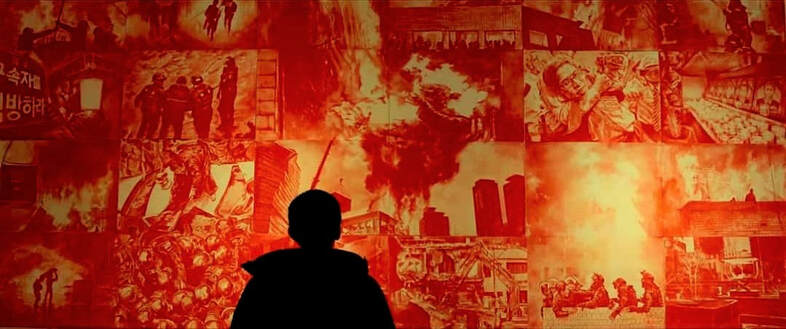BURNING
*****
Director: Lee Chang-dong
Screenwriters: Lee Chang-dong and Oh Jung-mi, based on the short story Barn Burning by Haruki Murakami.
Principal cast:
Ah-in Yoo
Steven Yeun
Jong-seo Jun
Country: South Korea/Japan
Classification: M
Runtime: 148 mins.
Australian release date: 18 April 2019
Previewed at: Palace Central, Sydney, on 25 March 2019.
Burning is the first film from South Korean director/writer Lee Chang-dong since Poetry in 2010. It’s been a long time between drinks but his latest effort will certainly slake your thirst for his brand of quality, thoughtful cinema. It deservedly won the International Critics Award (the FIPRESCI Prize) at the 2018 Cannes Film Festival and has picked up many other awards at festivals around the world. It’s easy to see why. Loosely based on Barn Burning, a short story by the great Japanese author Haruki Murakami, which in turn was influenced by an eponymous work written by William Faulkner in 1939, Burning transposes the action to Seoul and the border region adjacent to North Korea, where two of the protagonists were born and raised. At times, you can hear the DPRK’s propaganda broadcasts in the background. It’s a netherworld in which you’re never quite sure where you stand, nor indeed understand clearly the motivations and actions of the main characters. Lee has an oblique, ambiguous way of regarding his subjects.
One day in Seoul, courier and wannabe author Jongsu (Ah-in Yoo) runs into a childhood friend from his hometown, Haemi (Jong-seo Jun), and soon develops a crush on the free-spirited young woman. So, when she announces that she is off to Africa for an encounter with the Kalahari Bushmen, he readily agrees to make daily visits to her apartment to feed her cat. When he drives to the airport to pick her up on her return, he is crushed and somewhat mystified to find that she is in the company of the suave, Jay Gatsby-like Ben (Steven Yeun). Ben’s an enigma - he’s obviously very rich but doesn’t appear to work, has a hyper-neat apartment in the city, and moves in a scene that is cultured, educated and wealthy - and Haemi is in thrall to him. He seems to have no history and is totally unlike anyone she and Jongsu have previously encountered, as they both come from impoverished, working-class backgrounds. The odd threesome starts to hang out together and Ben introduces his new acquaintances to marijuana, a product that is extremely hard to come by in South Korea. While stoned one day, he reveals a strange secret to Jongsu, and the frustrated writer’s world is turned upside-down. When, not long after, Haemi goes missing, Jongsu becomes obsessed with finding out what has happened to her, while Ben just says she was prone to doing things like that. Indeed, she once said to Jongsu, “I just want to disappear, like I never existed”.
Lee Chang-dong’s and Oh Jung-mi’s Burning screenplay smoulders (no pun intended). It unfolds slowly and inexorably, building to a fiery, dramatic climax. It’s an unusual concept. Oh explains, “I first met director Lee Chang-dong in the film school in 2010 and learned storytelling from him. He taught us that we do not come up with a good story, but rather come across it. Like living organisms, good stories wander around us, and if we have the [sic] discerning eyes, we would finally recognise them”. For five years, the writers kicked around various ideas but none of them stood out. “We couldn’t quite answer why they ‘had’ to be made into films. It felt as though we were going around in circles, looking for an uncharted road. Just when we were getting too weary from the waiting, we stumbled upon Haruki Murakami’s short story Barn Burning”. It’s a mysterious scenario in which nothing really happens - until it does - and you can see why it attracted Lee and Oh. It’s also highly cinematic and cinematographer Hong Kyung-pyo has admirably captured the strangeness of the landscape and the story. Wonderfully augmenting this unnerving plot is an unusual, original score by Mowg, aka Korean composer Lee Sung-hyun.
Another of the great strengths of Burning is the superb casting. The three leads are outstanding. Many people will recognise Steven Yeun from television’s The Walking Dead series and Bong Joon-ho’s Okja, and Ah-in Yoo is also well-known in the Korean film industry, but this is Jong-seo Jun’s debut performance and she’s a knockout. She beautifully portrays Haemi’s singular combination of innocence and boldness and, based on her skills on display here, has a big future in cinema. This masterful work is full of false leads, red herrings and a sense of never being quite sure what is illusory and what is real. Its measured pace is deceiving so pay attention because every detail counts; you’ll be amply rewarded. Lee’s film also raises issues about class distinction, genetic influence on behaviour, the questing uncertainty of youth, love, jealousy, anger and revenge. In short, the human condition. It’s a magnificent achievement and one of the best films of the year to date.
